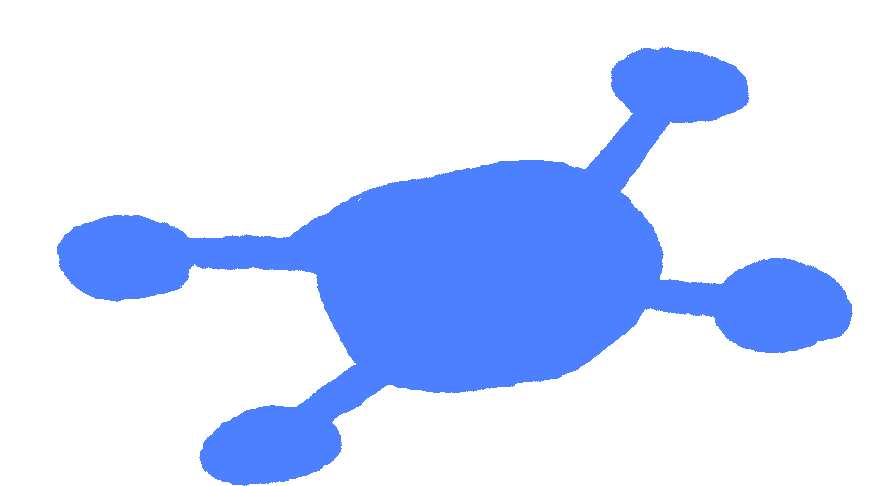An extensive degree across hardware and software
Michigan Robotics offers both Master’s and PhD programs that provide deep technical training in autonomous systems across hardware and software, preparing graduates to become full-stack roboticists in research, industry, and innovation.
Graduate students work alongside faculty on the latest research in leading facilities and working in partnerships across campus and industry to gain expertise across the fundamental areas of robotics. Our programs emphasize hands-on experience with real robotic systems and interdisciplinary collaboration that mirrors the complex challenges facing the field.
Michigan roboticists develop, teach, and learn technologies and socially engaged systems to improve everyday life, make our world safer, and tackle the pressing issues that society faces.
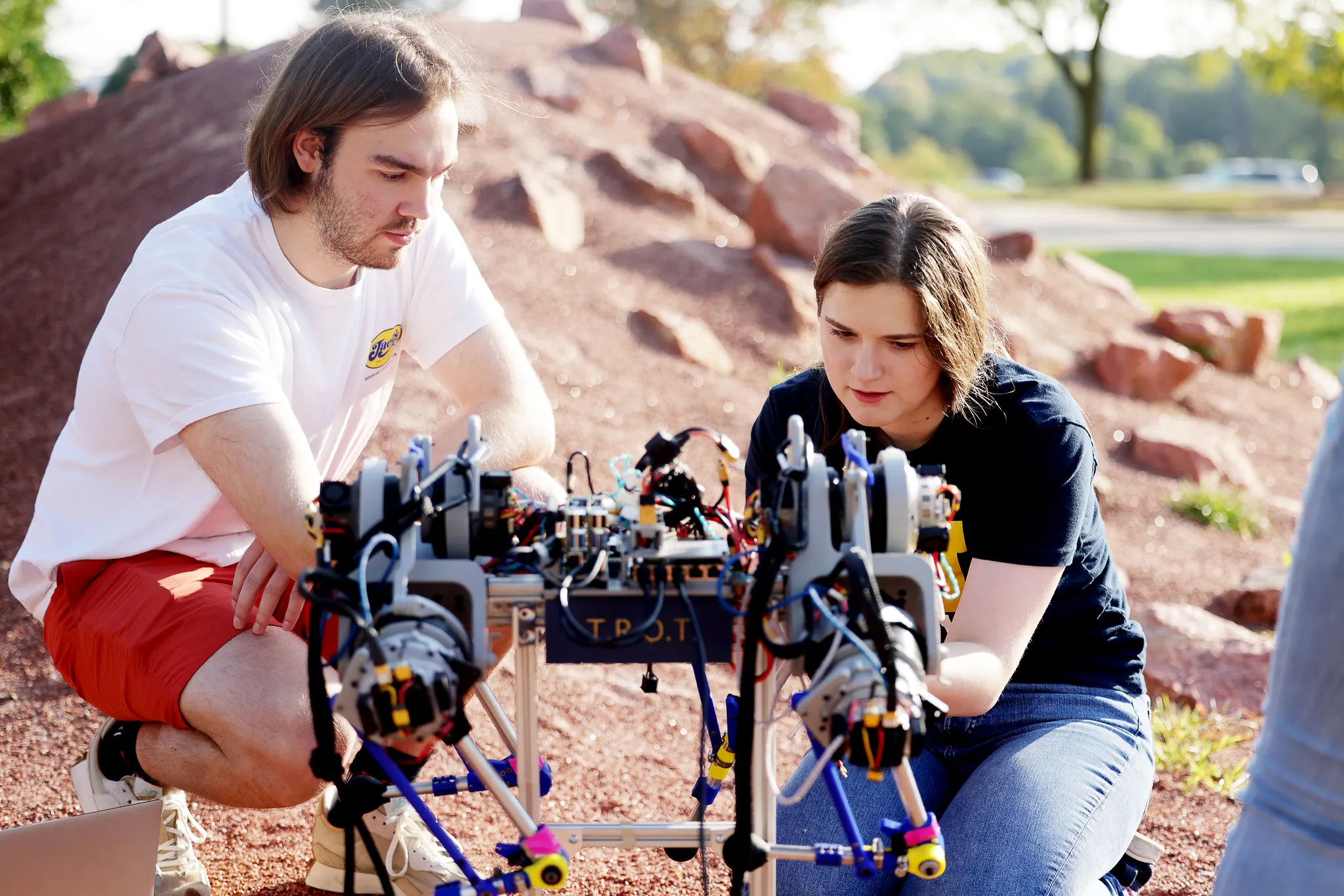
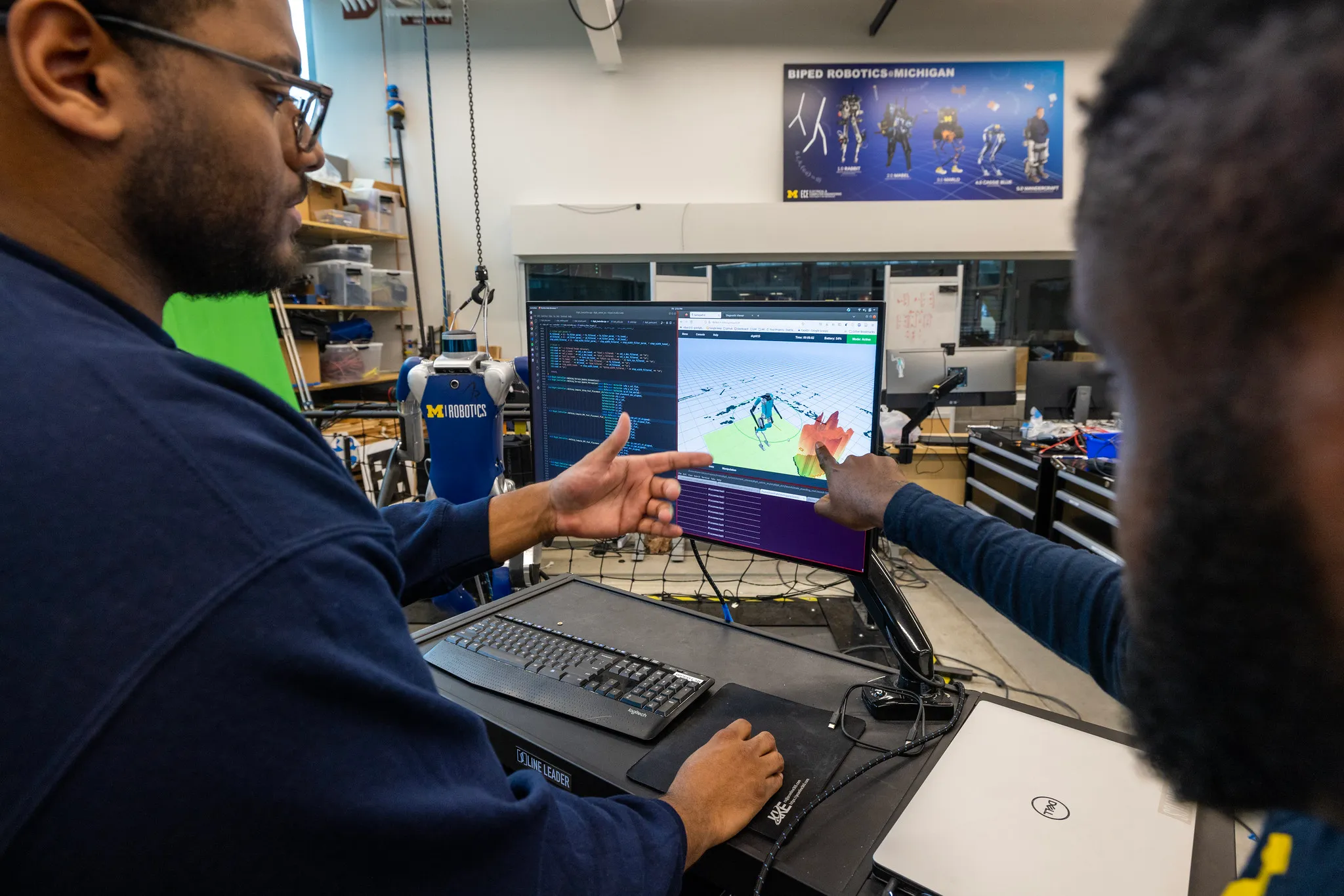
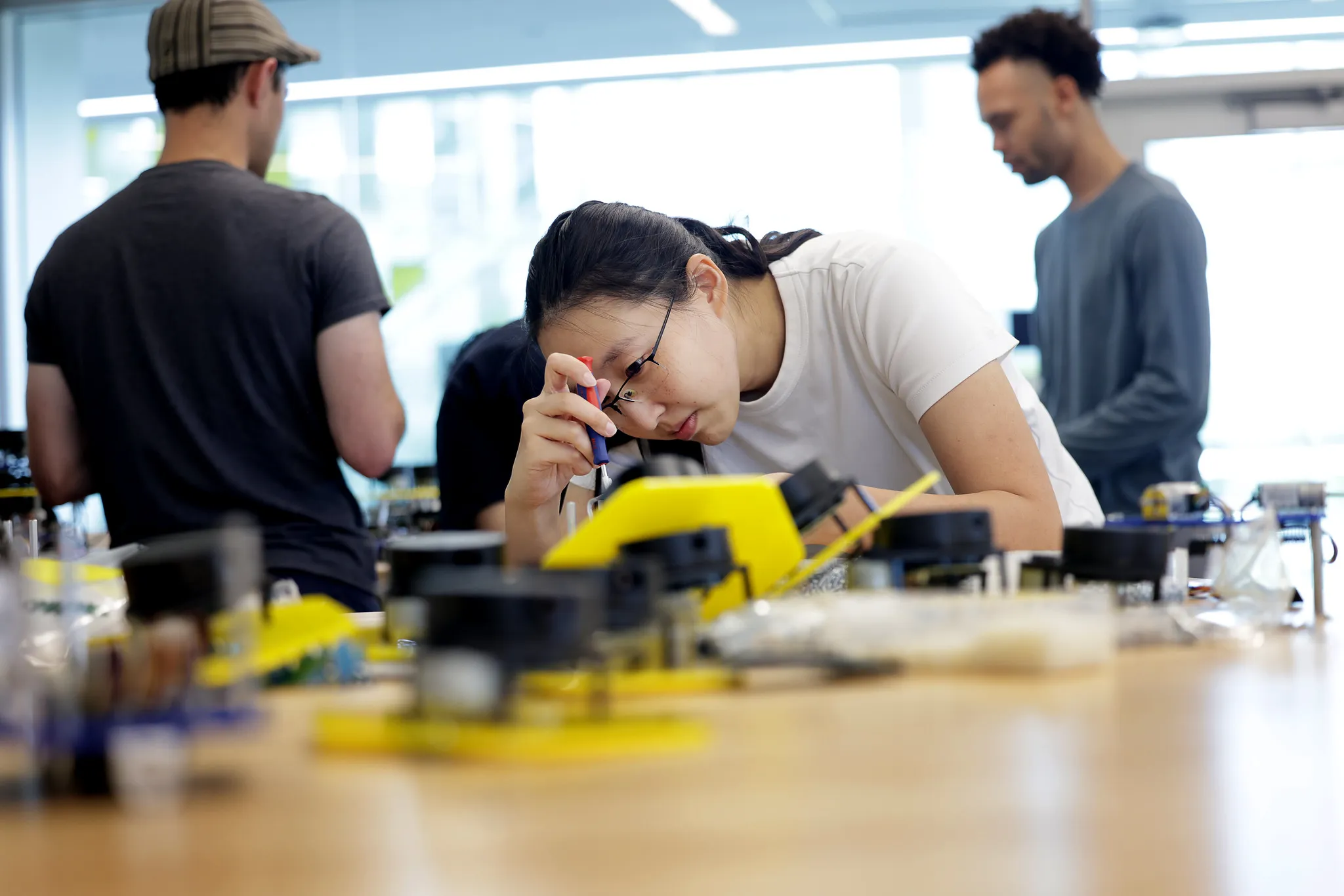
What graduate students do
Learn the core concepts
The Michigan Robotics graduate program consists of three main technical areas, which converge as students produce functioning robots:
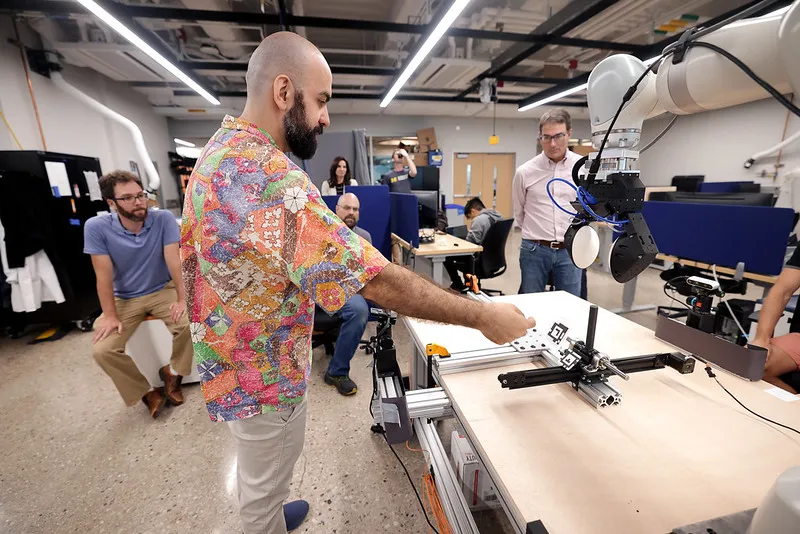
Sensing
of the environment, external agents, and internal information to determine state.
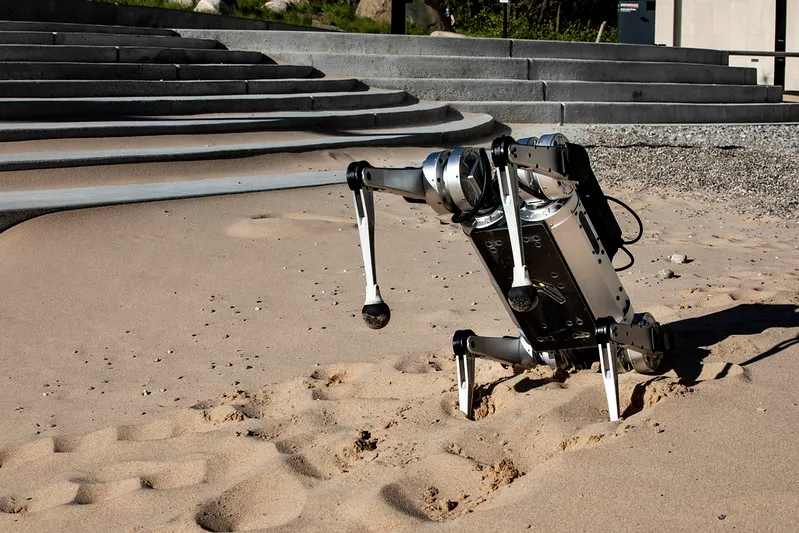
Reasoning
with that information to make decisions for guidance, control, and localization.
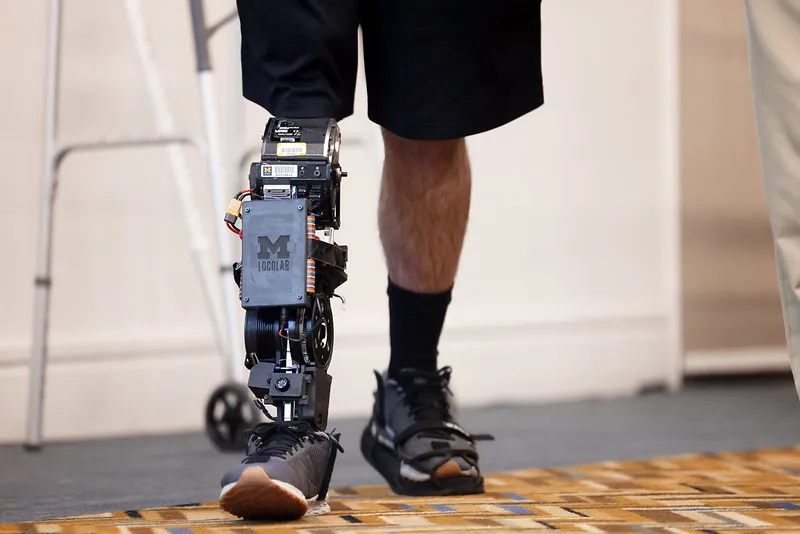
Acting
upon the body and environment to enable locomotion or interaction.
Conduct leading research
Graduate students work on fundamental and applied research problems that advance the field of robotics. Whether pursuing a Master’s or PhD, students collaborate with faculty and industry partners on projects spanning our focus areas.
Sampling of research projects
Evaluating the Performance of Spot in Automating Manufacturing Flow Rate Testing
The technical objective is to automate a manufacturing testing procedure using a quadraped mobile manipulator robot, also known as Spot, by exploring the reliability and accuracy of various pick and place, and mobility tasks.
Robot OCT Character
The primary technical goal of this project is to design, prototype, and integrate a character-based interface for a robotic OCT system that enhances human-robot interaction (HRI) specifically for pediatric patients during medical scans.
Human-Centric Approach to Reducing Discomfort in Social Navigation
To model human discomfort in social navigation and use it to create socially aware robot trajectories.
Multimodal Model-Based Reinforcement Learning for Autonomous Racing
The goal is to train a multimodal (camera, lidar, etc.) model-based reinforcement learning racing agent, and deploy it for real-time control on the F1TENTH platform in a physical track environment.
Choquet-integral based Machine Learning for Sensor Fusion
Develop a Choquet-integral based machine learning method for sensor fusion.
Gaussian Splatting-based Perception
Utilize gaussian splatting techniques to do pose estimation and gasp point generation.
The Effects of Touch in Physical Human-robot Interaction
We are working with Honda Research Institute US to examine how people respond to robot-initiated touch and the bounds of their comfortability with the different components related to touch to better define and design algorithms for future assistive robots.
Tools to Enable Automated Detection of Marine Archaeological Sites from Multibeam Sonar Data
The technical objective is to explore how combining real and simulated data, choosing an appropriate model architecture, and fine-tuning training parameters can produce the best results for shipwreck segmentation from multi-beam sonar data.
Active Perception with 3D Gaussian Splatting for Open Vocabulary Mobile Manipulation
Fuse and filter the semantic masks produced by vision-language models online with gaussian splatting to produce more robust object maps for finding and manipulating in-the-wild open-vocabulary household objects in an efficient, information-maximizing manner.
Intelligent Navigation of Autonomous Maritime Robots
Accomplish data collection for offline training for the reinforcement learning agent, integrate gym wrapper to enable online training, implement the tested model into real world experiment.
Heron Reinforcement Learning
Run baselines on the simulator Gazebo for the Heron unmanned surface vehicle (USV).
Development of Amputee-Prosthetic Leg Simulation Environment
Create a comprehensive simulation environment for an amputee-prosthetic leg system to enable future personalization of prosthetic controllers.
Cascaded Factor Graphs for Model Predictive Control
This project aims to create a planning and control method that, through factor graph representations, can generate optimal control trajectories over a belief space to provide computation and uncertainty handling benefits over existing methods.
Human-Robot Collaborative Object Transport
The aim of this project is to formalize strategies in the context of physically collaborative joint tasks between a human and a robot, construct a framework for communication of joint strategies, and evaluate an instantiation of the framework with participants in a user study.
Adaptation of Neural Transformer Models for Finger Motion
Developing an online neural decoder based on the poyo transformer architecture for experimental use.
Can LLMs Understand Disabilities?
To evaluate whether large language models (LLMs) can reason about disabilities by developing a repository of disabilities and corresponding activities of daily living (ADLs) or physical motions, and creating a pipeline for benchmarking LLM responses, with the goal of applying this reasoning capability to assistive robotics for personalized support of users with diverse needs.
Feasibility of A Task-invariant Ankle Exoskeleton Controller for Post-stroke Assistance: A Case Study
To develop and validate a modified task-invariant ankle exoskeleton controller that effectively delivers both dorsiflexion and plantarflexion torque to improve gait kinematics and kinetics in post-stroke patients.
Underwater Sonar Gaussian Splatting for Autonomous Underwater Vehicles
Create a Dense 3D mapping algorithm specifically for underwater autonomous vehicles to use for mapping large scenes.
Impact of Transfemoral Adjustable-Volume Sockets on Prosthetic Use in Daily Life
Optimizing an automatic detection algorithm for prosthetic daily life measures with foot-worn sensors.
Distributed Resilient Multi-robot Network Formation
Deepen the understanding of distributed control in the context of multi-robot systems and have an intellectual contribution to the literature as a conference paper.
Relative Pose Estimation for CubeSat Docking/Grappling
Develop, evaluate and test a relative pose estimation framework applicable for docking/grappling related tasks for satellites.
Researching Socially Aware Robot Navigation Algorithms
The objective is to research algorithms that will allow robots to navigate among crowds of humans in realistic human environments (e.g. includes static obstacles) in a way that respects social conventions.
Nonholonomic Pushing with Learned Dynamics Model
The objective is to improve the learned dynamics models in the MPC controllers for the MuSHR car pushing tasks by collecting real-world data and then evaluate the performance of different models in complex block control tasks.
Virtual Reality Microsurgery
To develop an image-integrated robotic microsurgical platform that combines adaptive perception through live optical coherence tomography (OCT) volumetric imaging with robotics, virtual reality (VR), and artificial intelligence (AI) to enhance microsurgical performance by resizing procedures to human scale and automating suturing tasks.
Propelling Human Creativity with LLMs
Propelling Human Creativity with LLMs through the design of a creative LLM agent, which will also be used in a user study for evaluation.
Virtual Reality Microsurgery robot system
To develop an image-integrated robotic microsurgical platform that combines adaptive perception through live optical coherence tomography (OCT) volumetric imaging with robotics, virtual reality (VR), and artificial intelligence (AI) to enhance microsurgical performance by resizing procedures to human scale and automating suturing tasks.
State Estimation and Systems Integration for a Stair-Climbing Hexapod Robot
The primary technical objective of my project is to develop a real-time state estimation system for a hexapod robot using existing sensors to enable accurate gait adjustments during autonomous stair climbing.
Automatic Stub Avoidance for a Powered Prosthetic Leg over Stairs and Obstacles
To integrate a time-of-flight sensor into a powered prosthetic leg for accurate detection and adaptation to varying stair and obstacle heights, improving stability and user mobility.
Efficient Reachability Analysis for Safe Motion Planning in High-Dimensional Robotic Systems
To develop and train a neural network that efficiently generates SPARROWS (Safe Planning for Articulated Robots Using Reachability-based Obstacle Avoidance With Spheres) for approximating the trajectory for the high-dimensional Digit robot.
Developing a Simulation Environment for Robotic Cleaning in Aircraft Cabins
To develop a simulation environment using IsaacLab for deploying and testing advanced planning and perception algorithms for autonomous robotic cleaning within aircraft cabins.
AURA Project
The technical objective of the AURA project this semester is to recreate the CoFRIDA robotic system and explore methods for an artist to interact with the robot using biometric data by adding these inputs into the training of a generative AI model to enhance and authenticate creativity.
OCT-and-AI guided Deformable Tissue Prediction.
Predicting the deformations of Tissue on Real Time using Deep learning
Dense Neural SLAM with low cost RGB-D sensors
To deepen my knowledge in gaussian splatting for SLAM. To evaluate my interest in pursuing a PhD down the road.
Tensegrity controller development based on reinforcement learning
Develop a well-trained controller by reinforcement learning to extend motion ability of the 3-bar tensegrity robot, including increasing robustness to resist noise and narrowing the sim2real gap.
Simulation Environment Development for Robots Operating Within an Aircraft Cabin
Compete a series tasks in the IsaacLab using deep learning models such as 3D reconstruction, point cloud semantic segmentation and pose estimation, etc.
Autonomous Marine Surface Robots
The objective of this project is to implement a real-time MPC framework for waypoint tracking, followed by path planning on an autonomous marine surface robot.
Automating Sensor Selection for Multi-Sensor Autonomous Driving Perception
This project aims to develop advanced methods for automating sensor selection in autonomous driving systems, with a focus on optimizing 3D perception under constrained computational resources.
Exploration of Indoor Navigation and Object Detection Methods for Smartglasses to Assist People with Visual Impairments
The primary technical goal of the research is to explore, implement, and evaluate suitable, efficient, and effective methods for indoor navigation and object detection on smartglasses, designed to enhance accessibility for individuals with visual impairments.
Adaptation of Neural Transformer Models for Finger Motion
Developing an online neural decoder based on the poyo transformer architecture for experimental use
Characterizing Legibility in the Context of Social Navigation
Understanding how various contextual factors like visibility, reactivity, etc affect the importance of legibility in context of social navigation
Sensor Optimization Based on Minimalist Vision
Develop and optimize algorithms for automated sensor optimization based on Minimalist Vision.
Vision-based Pushing with a Mobile Robot
Develop a visual localization tool to accurately estimate the poses of detected objects within the field of view of a mobile robot.
Multi-modality Pretraining Backbone for Autonomous Driving
Create an unified perception backbone for autonomous driving that could fuse different sensor data and extract latent feature for further downstreaming tasks.
Perception-aware Trajectory Generation with Bounded State Estimation Error
The research goal is to generate a trajectory for an autonomous aerial vehicle that minimizes and bounds the state estimation uncertainty/drift due to visual-inertial odometry.
"A Novel Swarmalator Model: Theory
Simulation, and Experimental Validation,To develop, analyze, and validate a novel swarmalator model that explicitly incorporates orientation and differential-drive (or unicycle) constraints, enabling controllable and programmable collective behavior both in simulation and on real robot platforms.
Mobile Robotics OCT for Human Imaging
The project aims to use a robotic arm to track and align with eyes to perform OCT imaging for patients in various postures.
Soft Robot Face Mask
Develop a soft robotic face mask mechanism that uses soft robotics techniques, material actuation, and prototyping to achieve self-sealing, enhancing respiratory support and minimizing the need for continuous provider intervention.
Mapping Sole Pressure Data to Differentiable Mobile Robots: A Low-Cost Approach for Human-Swarm Interaction
To develop a low-cost system that integrates pressure sensors embedded in a shoe sole with a differentiable mobile robot, enabling real-time mapping of foot pressure data to robotic motion for scalable human-swarm interaction
Dynamic Obstacle Avoidance for Robotic Systems: Analyzing Control Barrier Function Techniques
To explore safety-critical control strategies using Control Barrier Functions in dynamic environments, focusing on enhancing their application to avoid collisions with moving obstacles.
Control of Perturbed Human Standing Balance with Robotic Assistive Devices
Developing a musculoskeletal model of a human in order to simulate human balance under various different perturbations with varying different assistive devices using open sim.
Mobile manipulation in a 3DGS world representation
Demonstrate that the capabilities of the previous Lab work SPLANNING can be extended to a mobile manipulator.
LLAMA-ADAPTER for time series forecasting
To help develop a LLM model (Llama) for time series forecasting.
Robot Touch
The objective of this project is to develop a functional online experiment platform by integrating Onni and emBODY to enable body mapping of emotions.
3D Reconstruction Model for Occlusion Detection and Generative Shape Completion
A novel pipeline integrating segmentation, occlusion handling, and generative shape completion for limited-view 3D reconstruction.
Design and Analysis of a Novel High Performance Lower Limb Prosthesis
To develop a benchtop prototype of a novel high performance lower limb prosthesis and analyze its performance.
Multi-modal Adaptable Robot Ball for Land Exploration
Design, fabricate, and test a complete drivable prototype of the spherical microrobot (MARBLE) platform.
Task-Driven Active Perception
This work expects to develop a motion planning algorithm in radiance fields that can handle insufficient observations by actively perceiving the environment to achieve safe trajectory planning.
3D Reconstruction from Sparse Depth and Fake Depth Detection
Study 3D reconstruction for robotics vision, with focus on sparse depth data under low resource
Autonomous Path Planning for Microbot Swarm Navigation with Magnetic field Using a 6DOF Robotic Arm
This project focuses on programming a commercial 6DOF robotic arm to autonomously control and manipulate a magnetic field generated at its end effector. The primary goal is to guide a magnetic microrobot swarm to navigate efficiently toward a target location while moving around any obstacles. This project involves perception, path planning and manipulation.
Gait Optimal Control and Visual Odometry Tracking for Legged Robots
To design a general control system for gait control of legged robots using existing optimal control toolkits, and to investigate the feasibility of cheap fiducial marker-based tracking.
Multimodal Model-Based Reinforcement Learning for Autonomous Racing
The goal is to train a multimodal (camera, lidar, etc.) model-based reinforcement learning racing agent, and deploy it for real-time control on the F1TENTH platform in a physical track environment.
Simulation Framework for Collective Behavior of Microrobots
To develop a simulation framework that accurately models the collective behavior of spinning magnetic micro-disks, implementing basic control mechanisms for different environmental geometries.
Helmholtz Coil System
Create a bi-axial helmholtz coil system to demonstrate control of magnetic microrobot swarms.
Simultaneous System Identification and Model Predictive Control with No Dynamic Regret
Develop online learning algorithms for controlling nonlinear systems under uncertainty, with applications to target tracking by quadrotors, payload transportation by quadrupeds
Dense Neural SLAM with Low-Cost RGB-D Sensors
This project aims to develop neural approaches that enhance the robustness of Multi-Agent SLAM systems for real-time, dense scene reconstruction using low-cost RGB and depth sensors in dynamic environments.
Photorealistic Multi-Agent Collaborative 3D Reconstruction
This project aims to develop neural approaches that enhance the robustness of Multi-Agent SLAM systems for real-time, dense scene reconstruction using low-cost RGB and depth sensors in dynamic environments.
STARI
Develop ConOps and relevant systems for the STARI mission while also addressing vision based pose estimation and challenges with formation flying.
AURA Project
My primary technical objective is to work on adding collaborative functionality to an existing robotic painting arm system using different biometric sensors.
RS007 Manipulation and 3D Representation
Use sensor data to build a 3D representation of the workspace of the RS007 robot arm and write an algorithm to travel between poses without collisions.
Twisted Endoskeleton
The primary objective of this project is to develop twisted and coiled actuators derived from woven fibers that enable soft robots to achieve novel locomotion capabilities while exhibiting on-demand stiffness.
Reinforcement Learning for Kendama simulation
Reinforcement Learning for Solving Kendama
D Visual Representations for Diffusion and Trajectory Optimization
A baseline objective: Use ICP to achieve initial alignment of the screwdriver’s point cloud
demonstrate the approach’s feasibility. If ICP doesn’t work
we should explore learning-based alternatives to ICP
Safe Exploration for Autonomous Driving via Riemannian Manifold Learning
To develop RL exploration policies rooted in representation learning that enable faster and safer learning.
Toward Integrated Takeover Performance Measurement: Validation of Fréchet Distance as a Takeover Performance Metric
Conduct a human subject experiment in a conditional autonomous driving simulator and analyze the trajectory data to propose a novel metric in takeover performance
Using a hierarchy of simple learned models for complex manipulation tasks
The goal of this project is to develop a learning-based hierarchical planner using reinforcement learning and Model Predictive Control (MPC) to solve complex control tasks like the Kendama problem.
3D Probabilistic Semantic Mapping and Planning
This study focuses on building on an existing framework for an efficient, accurate, and probabilistic semantic mapping system optimized for mobile robots with limited computational resources. I will improve the codebase, add a ROS package, and implement language-based planning.
Regenerative Peripheral Nerve Interfaces (RPNIs)
The primary technical objective of this project is to develop firmware in C or Python that enables two prosthetic hands to process CAN commands from various development boards. All additional developments, such as optimizing communication protocols, refining control algorithms, designing PCBs or enhancing integration, are some of my stretch goals for the semester.
Spine board for legged robot and Dynamometer
Learning the nature of legged robot and gain practical experience in circuitary and programmming legged robots
State Estimation for Tri-legged Kresling Origami Parallel Continuum Robots Using Factor Graph Optimization
To develop and validate a factor graph-based state estimation framework for tri-legged Kresling origami parallel continuum robots by integrating Piecewise Constant Curvature kinematics, Extended Kalman Filter-based IMU correction, and coupling constraints, with extension to multi-layer configurations for hierarchical state estimation.
AURA
We are replicating the CoFRIDA system by CMU that enabled turn-taking painting between a human and a robot, and improving it by integrating it with ROS 2 and other sensors to ultimately investigate ways to authenticate - biometrically - a physical art piece's authenticity.
Knee Exo for Arthritis
The goal is to build a knee Exo skeleton from scratch and conduct a User study and validate the ability of the Exo to reduce pain for arthritis patients
Integrated Path Planning and MPC-Based Motion Control for High-Speed Obstacle Avoidance and Lane Changes for Autonomous Cars
To develop and simulate an integrated autonomous driving system that combines Hybrid A* or Motion Primitive A* path planning with Model Predictive Control for high-speed lane-changing and obstacle avoidance under dynamic constraints.
Emulating Human Biomechanics in a Powered Lower-Limb Prosthesis
To develop and evaluate a robotic lower-limb prosthesis that combines bio-inspired mechanical design and biomimetic control to improve gait adaptability across diverse ambulatory tasks.
Evaluating the Performance of Spot in Automating Manufacturing Flow Rate Testing
The technical objective is to automate a manufacturing testing procedure using a quadraped mobile manipulator robot, also known as Spot, by exploring the reliability and accuracy of various pick and place, and mobility tasks.
Robot OCT Character
The primary technical goal of this project is to design, prototype, and integrate a character-based interface for a robotic OCT system that enhances human-robot interaction (HRI) specifically for pediatric patients during medical scans.
Human-Centric Approach to Reducing Discomfort in Social Navigation
To model human discomfort in social navigation and use it to create socially aware robot trajectories.
Multimodal Model-Based Reinforcement Learning for Autonomous Racing
The goal is to train a multimodal (camera, lidar, etc.) model-based reinforcement learning racing agent, and deploy it for real-time control on the F1TENTH platform in a physical track environment.
Choquet-integral based Machine Learning for Sensor Fusion
Develop a Choquet-integral based machine learning method for sensor fusion.
Gaussian Splatting-based Perception
Utilize gaussian splatting techniques to do pose estimation and gasp point generation.
The Effects of Touch in Physical Human-robot Interaction
We are working with Honda Research Institute US to examine how people respond to robot-initiated touch and the bounds of their comfortability with the different components related to touch to better define and design algorithms for future assistive robots.
Tools to Enable Automated Detection of Marine Archaeological Sites from Multibeam Sonar Data
The technical objective is to explore how combining real and simulated data, choosing an appropriate model architecture, and fine-tuning training parameters can produce the best results for shipwreck segmentation from multi-beam sonar data.
Active Perception with 3D Gaussian Splatting for Open Vocabulary Mobile Manipulation
Fuse and filter the semantic masks produced by vision-language models online with gaussian splatting to produce more robust object maps for finding and manipulating in-the-wild open-vocabulary household objects in an efficient, information-maximizing manner.
Intelligent Navigation of Autonomous Maritime Robots
Accomplish data collection for offline training for the reinforcement learning agent, integrate gym wrapper to enable online training, implement the tested model into real world experiment.
Heron Reinforcement Learning
Run baselines on the simulator Gazebo for the Heron unmanned surface vehicle (USV).
Development of Amputee-Prosthetic Leg Simulation Environment
Create a comprehensive simulation environment for an amputee-prosthetic leg system to enable future personalization of prosthetic controllers.
Cascaded Factor Graphs for Model Predictive Control
This project aims to create a planning and control method that, through factor graph representations, can generate optimal control trajectories over a belief space to provide computation and uncertainty handling benefits over existing methods.
Human-Robot Collaborative Object Transport
The aim of this project is to formalize strategies in the context of physically collaborative joint tasks between a human and a robot, construct a framework for communication of joint strategies, and evaluate an instantiation of the framework with participants in a user study.
Adaptation of Neural Transformer Models for Finger Motion
Developing an online neural decoder based on the poyo transformer architecture for experimental use.
Can LLMs Understand Disabilities?
To evaluate whether large language models (LLMs) can reason about disabilities by developing a repository of disabilities and corresponding activities of daily living (ADLs) or physical motions, and creating a pipeline for benchmarking LLM responses, with the goal of applying this reasoning capability to assistive robotics for personalized support of users with diverse needs.
Feasibility of A Task-invariant Ankle Exoskeleton Controller for Post-stroke Assistance: A Case Study
To develop and validate a modified task-invariant ankle exoskeleton controller that effectively delivers both dorsiflexion and plantarflexion torque to improve gait kinematics and kinetics in post-stroke patients.
Underwater Sonar Gaussian Splatting for Autonomous Underwater Vehicles
Create a Dense 3D mapping algorithm specifically for underwater autonomous vehicles to use for mapping large scenes.
Impact of Transfemoral Adjustable-Volume Sockets on Prosthetic Use in Daily Life
Optimizing an automatic detection algorithm for prosthetic daily life measures with foot-worn sensors.
Distributed Resilient Multi-robot Network Formation
Deepen the understanding of distributed control in the context of multi-robot systems and have an intellectual contribution to the literature as a conference paper.
Relative Pose Estimation for CubeSat Docking/Grappling
Develop, evaluate and test a relative pose estimation framework applicable for docking/grappling related tasks for satellites.
Researching Socially Aware Robot Navigation Algorithms
The objective is to research algorithms that will allow robots to navigate among crowds of humans in realistic human environments (e.g. includes static obstacles) in a way that respects social conventions.
Nonholonomic Pushing with Learned Dynamics Model
The objective is to improve the learned dynamics models in the MPC controllers for the MuSHR car pushing tasks by collecting real-world data and then evaluate the performance of different models in complex block control tasks.
Virtual Reality Microsurgery
To develop an image-integrated robotic microsurgical platform that combines adaptive perception through live optical coherence tomography (OCT) volumetric imaging with robotics, virtual reality (VR), and artificial intelligence (AI) to enhance microsurgical performance by resizing procedures to human scale and automating suturing tasks.
Propelling Human Creativity with LLMs
Propelling Human Creativity with LLMs through the design of a creative LLM agent, which will also be used in a user study for evaluation.
Virtual Reality Microsurgery robot system
To develop an image-integrated robotic microsurgical platform that combines adaptive perception through live optical coherence tomography (OCT) volumetric imaging with robotics, virtual reality (VR), and artificial intelligence (AI) to enhance microsurgical performance by resizing procedures to human scale and automating suturing tasks.
State Estimation and Systems Integration for a Stair-Climbing Hexapod Robot
The primary technical objective of my project is to develop a real-time state estimation system for a hexapod robot using existing sensors to enable accurate gait adjustments during autonomous stair climbing.
Automatic Stub Avoidance for a Powered Prosthetic Leg over Stairs and Obstacles
To integrate a time-of-flight sensor into a powered prosthetic leg for accurate detection and adaptation to varying stair and obstacle heights, improving stability and user mobility.
Efficient Reachability Analysis for Safe Motion Planning in High-Dimensional Robotic Systems
To develop and train a neural network that efficiently generates SPARROWS (Safe Planning for Articulated Robots Using Reachability-based Obstacle Avoidance With Spheres) for approximating the trajectory for the high-dimensional Digit robot.
Developing a Simulation Environment for Robotic Cleaning in Aircraft Cabins
To develop a simulation environment using IsaacLab for deploying and testing advanced planning and perception algorithms for autonomous robotic cleaning within aircraft cabins.
AURA Project
The technical objective of the AURA project this semester is to recreate the CoFRIDA robotic system and explore methods for an artist to interact with the robot using biometric data by adding these inputs into the training of a generative AI model to enhance and authenticate creativity.
OCT-and-AI guided Deformable Tissue Prediction.
Predicting the deformations of Tissue on Real Time using Deep learning
Dense Neural SLAM with low cost RGB-D sensors
To deepen my knowledge in gaussian splatting for SLAM. To evaluate my interest in pursuing a PhD down the road.
Tensegrity controller development based on reinforcement learning
Develop a well-trained controller by reinforcement learning to extend motion ability of the 3-bar tensegrity robot, including increasing robustness to resist noise and narrowing the sim2real gap.
Simulation Environment Development for Robots Operating Within an Aircraft Cabin
Compete a series tasks in the IsaacLab using deep learning models such as 3D reconstruction, point cloud semantic segmentation and pose estimation, etc.
Autonomous Marine Surface Robots
The objective of this project is to implement a real-time MPC framework for waypoint tracking, followed by path planning on an autonomous marine surface robot.
Automating Sensor Selection for Multi-Sensor Autonomous Driving Perception
This project aims to develop advanced methods for automating sensor selection in autonomous driving systems, with a focus on optimizing 3D perception under constrained computational resources.
Exploration of Indoor Navigation and Object Detection Methods for Smartglasses to Assist People with Visual Impairments
The primary technical goal of the research is to explore, implement, and evaluate suitable, efficient, and effective methods for indoor navigation and object detection on smartglasses, designed to enhance accessibility for individuals with visual impairments.
Adaptation of Neural Transformer Models for Finger Motion
Developing an online neural decoder based on the poyo transformer architecture for experimental use
Characterizing Legibility in the Context of Social Navigation
Understanding how various contextual factors like visibility, reactivity, etc affect the importance of legibility in context of social navigation
Sensor Optimization Based on Minimalist Vision
Develop and optimize algorithms for automated sensor optimization based on Minimalist Vision.
Vision-based Pushing with a Mobile Robot
Develop a visual localization tool to accurately estimate the poses of detected objects within the field of view of a mobile robot.
Multi-modality Pretraining Backbone for Autonomous Driving
Create an unified perception backbone for autonomous driving that could fuse different sensor data and extract latent feature for further downstreaming tasks.
Perception-aware Trajectory Generation with Bounded State Estimation Error
The research goal is to generate a trajectory for an autonomous aerial vehicle that minimizes and bounds the state estimation uncertainty/drift due to visual-inertial odometry.
"A Novel Swarmalator Model: Theory
Simulation, and Experimental Validation,To develop, analyze, and validate a novel swarmalator model that explicitly incorporates orientation and differential-drive (or unicycle) constraints, enabling controllable and programmable collective behavior both in simulation and on real robot platforms.
Mobile Robotics OCT for Human Imaging
The project aims to use a robotic arm to track and align with eyes to perform OCT imaging for patients in various postures.
Soft Robot Face Mask
Develop a soft robotic face mask mechanism that uses soft robotics techniques, material actuation, and prototyping to achieve self-sealing, enhancing respiratory support and minimizing the need for continuous provider intervention.
Mapping Sole Pressure Data to Differentiable Mobile Robots: A Low-Cost Approach for Human-Swarm Interaction
To develop a low-cost system that integrates pressure sensors embedded in a shoe sole with a differentiable mobile robot, enabling real-time mapping of foot pressure data to robotic motion for scalable human-swarm interaction
Dynamic Obstacle Avoidance for Robotic Systems: Analyzing Control Barrier Function Techniques
To explore safety-critical control strategies using Control Barrier Functions in dynamic environments, focusing on enhancing their application to avoid collisions with moving obstacles.
Control of Perturbed Human Standing Balance with Robotic Assistive Devices
Developing a musculoskeletal model of a human in order to simulate human balance under various different perturbations with varying different assistive devices using open sim.
Mobile manipulation in a 3DGS world representation
Demonstrate that the capabilities of the previous Lab work SPLANNING can be extended to a mobile manipulator.
LLAMA-ADAPTER for time series forecasting
To help develop a LLM model (Llama) for time series forecasting.
Robot Touch
The objective of this project is to develop a functional online experiment platform by integrating Onni and emBODY to enable body mapping of emotions.
3D Reconstruction Model for Occlusion Detection and Generative Shape Completion
A novel pipeline integrating segmentation, occlusion handling, and generative shape completion for limited-view 3D reconstruction.
Design and Analysis of a Novel High Performance Lower Limb Prosthesis
To develop a benchtop prototype of a novel high performance lower limb prosthesis and analyze its performance.
Multi-modal Adaptable Robot Ball for Land Exploration
Design, fabricate, and test a complete drivable prototype of the spherical microrobot (MARBLE) platform.
Task-Driven Active Perception
This work expects to develop a motion planning algorithm in radiance fields that can handle insufficient observations by actively perceiving the environment to achieve safe trajectory planning.
3D Reconstruction from Sparse Depth and Fake Depth Detection
Study 3D reconstruction for robotics vision, with focus on sparse depth data under low resource
Autonomous Path Planning for Microbot Swarm Navigation with Magnetic field Using a 6DOF Robotic Arm
This project focuses on programming a commercial 6DOF robotic arm to autonomously control and manipulate a magnetic field generated at its end effector. The primary goal is to guide a magnetic microrobot swarm to navigate efficiently toward a target location while moving around any obstacles. This project involves perception, path planning and manipulation.
Gait Optimal Control and Visual Odometry Tracking for Legged Robots
To design a general control system for gait control of legged robots using existing optimal control toolkits, and to investigate the feasibility of cheap fiducial marker-based tracking.
Multimodal Model-Based Reinforcement Learning for Autonomous Racing
The goal is to train a multimodal (camera, lidar, etc.) model-based reinforcement learning racing agent, and deploy it for real-time control on the F1TENTH platform in a physical track environment.
Simulation Framework for Collective Behavior of Microrobots
To develop a simulation framework that accurately models the collective behavior of spinning magnetic micro-disks, implementing basic control mechanisms for different environmental geometries.
Helmholtz Coil System
Create a bi-axial helmholtz coil system to demonstrate control of magnetic microrobot swarms.
Simultaneous System Identification and Model Predictive Control with No Dynamic Regret
Develop online learning algorithms for controlling nonlinear systems under uncertainty, with applications to target tracking by quadrotors, payload transportation by quadrupeds
Dense Neural SLAM with Low-Cost RGB-D Sensors
This project aims to develop neural approaches that enhance the robustness of Multi-Agent SLAM systems for real-time, dense scene reconstruction using low-cost RGB and depth sensors in dynamic environments.
Photorealistic Multi-Agent Collaborative 3D Reconstruction
This project aims to develop neural approaches that enhance the robustness of Multi-Agent SLAM systems for real-time, dense scene reconstruction using low-cost RGB and depth sensors in dynamic environments.
STARI
Develop ConOps and relevant systems for the STARI mission while also addressing vision based pose estimation and challenges with formation flying.
AURA Project
My primary technical objective is to work on adding collaborative functionality to an existing robotic painting arm system using different biometric sensors.
RS007 Manipulation and 3D Representation
Use sensor data to build a 3D representation of the workspace of the RS007 robot arm and write an algorithm to travel between poses without collisions.
Twisted Endoskeleton
The primary objective of this project is to develop twisted and coiled actuators derived from woven fibers that enable soft robots to achieve novel locomotion capabilities while exhibiting on-demand stiffness.
Reinforcement Learning for Kendama simulation
Reinforcement Learning for Solving Kendama
D Visual Representations for Diffusion and Trajectory Optimization
A baseline objective: Use ICP to achieve initial alignment of the screwdriver’s point cloud
demonstrate the approach’s feasibility. If ICP doesn’t work
we should explore learning-based alternatives to ICP
Safe Exploration for Autonomous Driving via Riemannian Manifold Learning
To develop RL exploration policies rooted in representation learning that enable faster and safer learning.
Toward Integrated Takeover Performance Measurement: Validation of Fréchet Distance as a Takeover Performance Metric
Conduct a human subject experiment in a conditional autonomous driving simulator and analyze the trajectory data to propose a novel metric in takeover performance
Using a hierarchy of simple learned models for complex manipulation tasks
The goal of this project is to develop a learning-based hierarchical planner using reinforcement learning and Model Predictive Control (MPC) to solve complex control tasks like the Kendama problem.
3D Probabilistic Semantic Mapping and Planning
This study focuses on building on an existing framework for an efficient, accurate, and probabilistic semantic mapping system optimized for mobile robots with limited computational resources. I will improve the codebase, add a ROS package, and implement language-based planning.
Regenerative Peripheral Nerve Interfaces (RPNIs)
The primary technical objective of this project is to develop firmware in C or Python that enables two prosthetic hands to process CAN commands from various development boards. All additional developments, such as optimizing communication protocols, refining control algorithms, designing PCBs or enhancing integration, are some of my stretch goals for the semester.
Spine board for legged robot and Dynamometer
Learning the nature of legged robot and gain practical experience in circuitary and programmming legged robots
State Estimation for Tri-legged Kresling Origami Parallel Continuum Robots Using Factor Graph Optimization
To develop and validate a factor graph-based state estimation framework for tri-legged Kresling origami parallel continuum robots by integrating Piecewise Constant Curvature kinematics, Extended Kalman Filter-based IMU correction, and coupling constraints, with extension to multi-layer configurations for hierarchical state estimation.
AURA
We are replicating the CoFRIDA system by CMU that enabled turn-taking painting between a human and a robot, and improving it by integrating it with ROS 2 and other sensors to ultimately investigate ways to authenticate - biometrically - a physical art piece's authenticity.
Knee Exo for Arthritis
The goal is to build a knee Exo skeleton from scratch and conduct a User study and validate the ability of the Exo to reduce pain for arthritis patients
Integrated Path Planning and MPC-Based Motion Control for High-Speed Obstacle Avoidance and Lane Changes for Autonomous Cars
To develop and simulate an integrated autonomous driving system that combines Hybrid A* or Motion Primitive A* path planning with Model Predictive Control for high-speed lane-changing and obstacle avoidance under dynamic constraints.
Emulating Human Biomechanics in a Powered Lower-Limb Prosthesis
To develop and evaluate a robotic lower-limb prosthesis that combines bio-inspired mechanical design and biomimetic control to improve gait adaptability across diverse ambulatory tasks.
Publish, pitch, and present
Graduate students regularly publish their research in top-tier conferences and journals, establishing their reputation in the robotics community. They present their work at international conferences, such as IROS, ICRA, and RSS, building networks and gaining feedback from leading researchers worldwide.
Students also take advantage of the deep entrepreneurial and business programs available at Michigan through the College of Engineering and Ross School of Business to develop skills and market test ideas by pitching their innovations to industry partners, investors, and startup competitions, translating research into real-world applications.
Build community
Graduate students contribute to a vibrant robotics community through multiple channels:
-
Championed originally by our students, the department values include robotics with respect, enthusiastic outreach, and integrity in action.
-
Robotics Graduate Student Council (RGSC)
Group that organizes social events, professional development workshops, peer support networks, and works with department leadership to improve the student experience. -
We regularly partner with community organizations to show off our work and inspire future roboticists, as well as celebrating those who take part in such community work.
-
Collaborate together and beyond
Our building and program were designed from the ground-up to foster cross-lab partnerships and interdisciplinary connections that strengthen the entire robotics ecosystem. That means there’s likely an expert who can help solve your problem just a desk, hall, or building away.
Teach and mentor
Graduate students gain valuable teaching experience by serving as graduate student instructors (GSIs) for undergraduate and graduate courses. This experience helps develop communication skills and provides insights into pedagogical approaches.
There are also opportunities to be a mentor for peers or undergraduates, and leadership training programs to gain differentiating skills and new approaches to working in a collaborative field.
Robotics graduate program highlights
Where our graduates go
Our Robotics graduate alumni are highly sought after by a diverse range of innovative companies and institutions. Here’s a sample of where they have launched their careers, provided by the College of Engineering Career Center.
Masters Program Alumni Employers
Showing a selection of top employers by placement frequency.
- Amazon
- Apple
- Applied Intuition
- Aptiv
- Aurora Innovation
- Blue Origin
- Boeing
- Bosch
- Collins Aerospace
- Consumers Energy
- Dell
- Deloitte
- DENSO
- Eli Lilly
- Epic
- FANUC
- Ford Motor Company
- GE Aviation
- General Dynamics
- General Motors
- Gentex Corporation
- Honda
- Honeywell
- Hyundai Mobis
- IBM
- Intel
- Intuitive Surgical
- John Deere
- Johns Hopkins Applied Physics Laboratory
- Johnson & Johnson
- KLA
- KPMG
- Kuka
- Lear
- Lockheed Martin
- Magna
- MathWorks
- May Mobility
- Meta
- Microsoft
- NASA Jet Propulsion Laboratory
- National Instruments
- Northrop Grumman
- NVIDIA
- Our Next Energy
- Parker Hannifin
- Path Robotics
- Procter & Gamble
- Qualcomm
- Raytheon
- Rivian
- Rockwell Automation
- Samsung
- Shield AI
- Siemens
- Southwest Research Institute
- SpaceX
- Stellantis
- Stryker
- Symbotic
- Tesla
- Texas Instruments
- Toyota
- University of Michigan
- Waymo
- Whirlpool
- Zoox
Doctoral Program Alumni Employers
- Amazon
- Apple
- Applied Intuition
- Aurora Flight Sciences
- Aurora Innovation
- Battelle
- Boston Dynamics
- Ford Motor Company
- General Motors
- Gideon Brothers
- Honeywell
- Johns Hopkins Applied Physics Laboratory
- Kodiak Robotics
- Meta
- Microsoft
- Motional
- NASA Jet Propulsion Laboratory
- NVIDIA
- Path Robotics
- RIOS Intelligent Machines
- Rivian
- Shield AI
- Sixth Extinction
- Southwest Research Institute
- SRI International
- Toyota Research Institute
- Tusimple
- University of Michigan
- Virtualitics
- Waymo
- Zoox
Become a Michigan Robotics graduate student
Graduate admissions
Apply for either our MS or PhD programs in Robotics, learn about transferring, adding a degree, or continuing on with SUGS.




